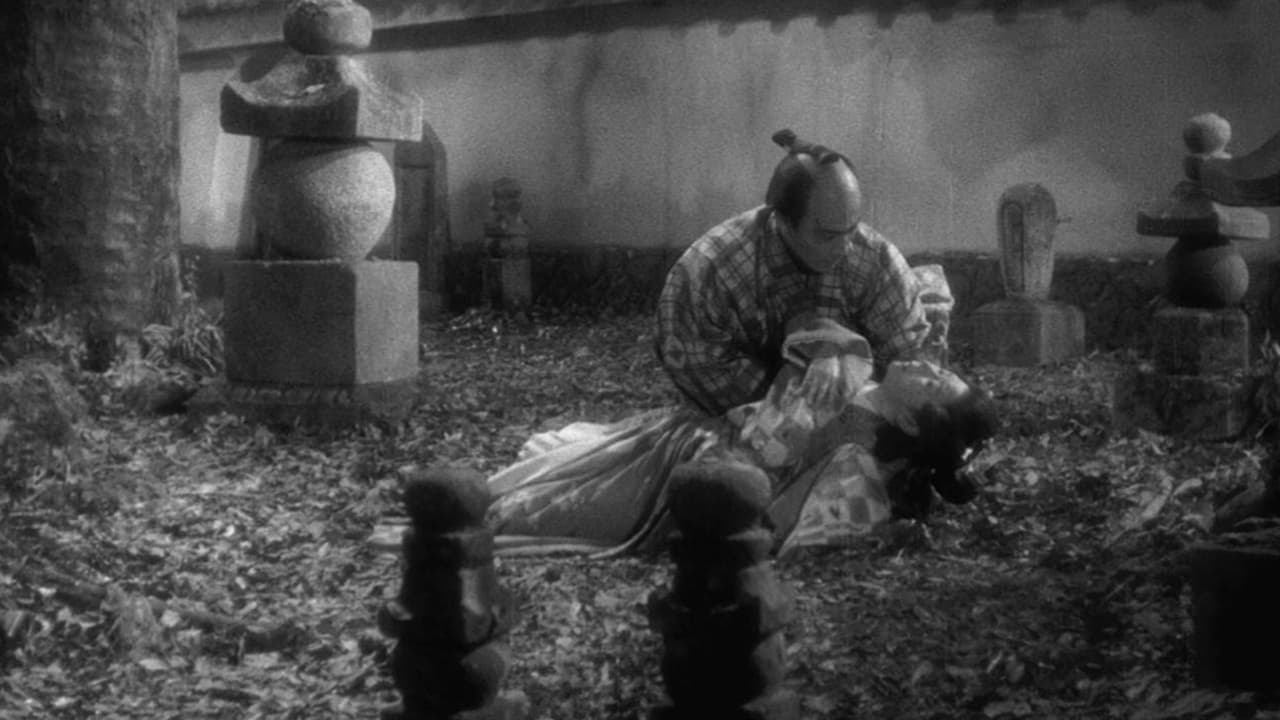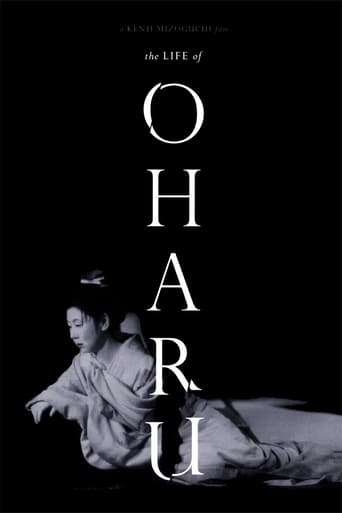



Great Film overall
The performances transcend the film's tropes, grounding it in characters that feel more complete than this subgenre often produces.
View Moreif their story seems completely bonkers, almost like a feverish work of fiction, you ain't heard nothing yet.
View MoreThis is ultimately a movie about the very bad things that can happen when we don't address our unease, when we just try to brush it off, whether that's to fit in or to preserve our self-image.
View MoreAlthough much of Kenji Mizoguchi's early work is now lost, the Japanese director is regarded as one of the country's finest thanks mainly to a handful of films made in the 1950s, many of which are considered masterpieces. The likes of Ugetsu Monogatari, Sansho the Bailiff and Street of Shame will no doubt be known to anyone with a keen interest in cinema, but none have the same lasting impression as The Life of Oharu, Mizoguchi's tale of one woman's plight in 1600's Japan. He was considered one of the first feminist directors, and much of his life was spent writing about their mistreatment at the hands of a matriarchal society rooted in class tradition. He was also known for frequenting brothels, but rather than paying for their services, Mizoguchi would instead listen to their stories. We meet Oharu (Kinuyo Tanaka) as a middle-aged prostitute, spending her nights by the city's gates begging or trying to sell her body to drunken wanderers.She tells her friends how earlier that night an older man had brought her to a home full of young men, displaying her ageing face to the group as a way to convince them not to pay for prostitutes. They ask Oharu about her past, but she doesn't want to talk about it. Visiting a Buddhist temple, she notices that one of the statutes of Buddha bares a striking resemblance to her one and only love, a lowly retainer named Katsunosuke (Toshiro Mifune). Decades earlier, Oharu was a woman of high station, and shunned the advances of the young page simply because society wouldn't allow it. She could not resist true love however, and the two are eventually caught. While he is sent to the chopping block, Oharu's family are stripped of their status and forced to live out in the country. Her father (Ichiro Sugai) blames Oharu, but his attitude changes when she is chosen to produce the heir of Lord Matsudaira (Toshiaki Konoe). However, she is banished after giving birth to a boy to return to a family who will soon sell her into prostitution.What transpires is a series of cruel punishments inflicted on our protagonist, and tragedy is born out of the fact that Oharu makes few of her own choices. There seems to be no place for true love in this society, something that still effects many countries today. A system seems to be in place that deflects the blame from the men who usher Oharu into these positions. She eventually serves as a maid, but loses her post when she is recognised from her days as a prostitute, and is even turned away from becoming a nun because of her 'sinful' past. The plot may sound like pure melodrama, but Mizoguchi is careful to avoid using broad strokes or losing focus of the larger picture. The camera is mostly still and precise, and also keeps its distance. Mizoguchi isn't interested in grand emotive close-ups - he wants you to see the whole picture as Oharu is shoved through her life like a puppet of little value. Most of us have gone through our lives making choices based on our core values, having the opportunity to stand up against anything that may threaten our moral code. The Life of Oharu is about a character completely stripped of this freedom, and her strength to bend rather than break. It's incredibly bleak stuff, but a masterpiece of measured character study.
View MoreA Role Perfect For Machiko KyôIn 1951, Machiko Kyô made six films and in 1952, she made another two. This was one hard- working actress. Possibly this could be the reason why Kinuyo Tanaka is cast in the leading role of Ohara in Kenji Mizoguchi's aikaku ichidai onna/The Life of Oharu (1952). Unfortunately, Kinuyo Tanaka is miscast as Ohara. She succeeds in the later half of the film as an ageing prostitute but is totally unconvincing as a young and desirable beauty. This becomes even more of an issue each time a character refers to Ohara as uniquely beautiful.The Life of Oharu is a catalogue of a young woman's downfall in 17th century Japan. The film goes from one tragedy to the next without much pause or relief.Kenji Mizoguchi is a brilliant director, so there are some stunning moments within the movie but it is irrevocably harmed by the casting of Kinuyo Tanaka. The role of Ohara should have been played by Machiko Kyô and her immense talent would have most certainly elevated this movie. In 1953, Machiko Kyô stole the show as the ghost Lady Wakasa in Kenji Mizoguchi's classic film, Ugetsu monogatari (1953) and again as Mickey in the classic Akasen chitai/Street Of Shame (1956).
View MoreThis is a deeply moving film, essentially a set of tableau, small episodes representing the fall and degradation of a naive noblewoman, brought down by her love for a commoner, desperate bad fortune, and the hypocrisy of a feudal society that condemned her for making the choices forced upon her. The camera-work is beautifully fluid, with long flowing takes, so different from what we expect from that other great director of the period, Ozu. It is carefully paced, allowing the force of the story to carry the viewer along to the desperately sad ending. The movie is far more restrained than you would expect for the topic, it avoids any didacticism, but still makes undeniably clear the directors disgust at how a society can force someone into such degradation. A very beautiful movie, essential viewing for anyone interested in the period.
View MoreKenji Mizoguchi's Life of Oharu is the tragic, humanistic tale of, well, the life of a woman named Oharu. Born into luxury, she errs with a man of lower class. For this offense, she is exiled along with her parents, convicted of letting their child run wild. As the film progresses, Oharu goes through about a thousand hardships - hell, any normal person would have killed herself after experiencing just the first of Oharu's hardships! Life of Oharu is very heavy, but it avoids emotional manipulation. It even has a couple of humorous moments. If you doubt me, watch the scene where the jealous wife pesters her husband, trying to force him to admit that he first met Oharu at a brothel. The man is being shaved by his personal barber, and his wife keeps riding up on his side. So the husband lifts his mirror and walks a few spaces away, just to have his wife sidle up right against him again! The climax to this particular episode (the part with the cat, if you're confused) is also quite humorous. Still, most of the film is heart-rending. It's also amazingly directed by Mizoguchi. His camera movement is exquisite, absolutely exquisite. I was left a little disappointed in Sansho the Bailiff, often said to be his best film, but the direction of Oharu is original and masterful. The acting is also wonderful. 10/10.
View More